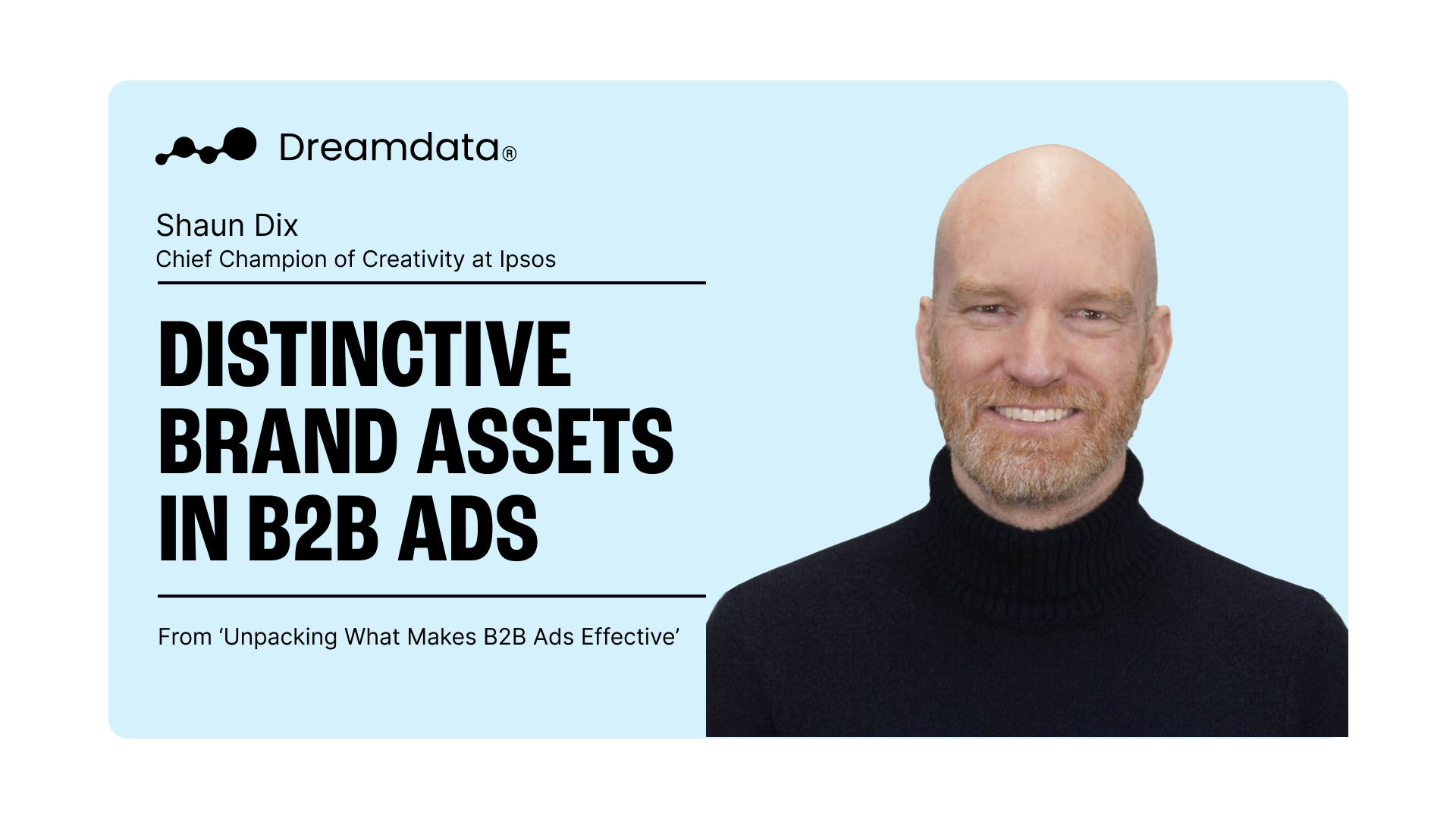Unpacking What Makes B2B Ads Effective
What makes an ad unforgettable?
According to Shaun Dix, the Chief Champion of Creativity at Ipsos, the secret to creating standout ads is throwing conformity out the window.
Shaun’s unique approach is to embrace the "misfit" mindset, pushing brands to shake off tradition and tell stories that resonate on a deeply human level.
In a recent conversation for the Attributed Podcast, Shaun shared how advertisers, especially in the often-stiff world of B2B, can create effective, memorable ads that create cultural impact.
Here’s what Shaun had to say about breaking the mold and why it pays to be a misfit in today’s saturated ad space.
You can listen to the entire conversation here.
What makes a good B2B ad?
Advertising is an industry that’s paradoxically brimming with creativity but stuck in a rut of predictability. But Shaun explains that while creativity in advertising is crucial, effectiveness should be your ultimate goal.
According to him, a good ad must do two things:
Generate branded attention: the ad should be memorable and clearly associated with the brand
Drive behavior change: both in the short term (such as driving traffic or sales) and in the long term (building brand equity).
He further explains that creative effectiveness is about standing out amidst the overwhelming "culture of conformity" in advertising.
Instead of blending into the background, Shaun says brands need to embrace a "misfit" mindset, challenging norms and resonating with audiences through empathy, humor, and storytelling.
How empathy impacts ROI
Many brands focus on performance-based results, aiming for direct outcomes like leads or sales.
However for Shaun, a good ad is about more than just metrics, it’s about making people feel seen and building a brand that people remember and trust.
Even in professional settings, human beings respond to creativity and emotion just like consumers in B2C environments.
Ipsos’ data shows that empathy in ads is 4x stronger than emotion in forging connections with audiences.
You really really really really need to understand the people that you're communicating to with your ads otherwise there's no chance of empathy a good story or any of that
For brands willing to invest in understanding their audiences, the payoff is real. It’s about more than just clicks or conversions; empathy builds a brand that people remember and trust.
Shaun mentions that Ipsos’ pre-market testing consistently correlates with in-market results, proving that data-driven empathy can translate into real-world impact.
Ipsos’ latest book, Misfits, encourages brands to break away from advertising norms and embrace creativity in a way that adds real value to their audience.
By tapping into empathy and understanding what truly resonates with their audience, B2B brands can craft memorable, impactful ads.
Balancing short-term and long-term ad impact
Shaun urges marketers to strike a balance between short-term gains with long-term brand equity.
This is not just about driving immediate action like clicks or conversions. Building brand equity is what makes people remember and trust your brand over time.
In a noisy digital world, ads that only target immediate outcomes can feel transactional and are easily forgotten.
To show this balance in action, Shaun used the example of telecommunications ads, which often promote short-term offers but weave in brand messages that establish a longer-term emotional connection with consumers.
While it’s important to drive immediate actions like visits or sign-ups, be sure to not neglect long-term messaging that builds trust and loyalty.
The importance of distinctive brand assets
Shaun also pointed out that many B2B brands fall short when it comes to leveraging distinctive brand assets, such as logos, sounds, and color codes.
It makes no sense if you remember an ad and you can't remember the brand or even worse, which happens a lot, is we get incorrect brand attribution or linkage.
Distinctive brand assets help cut through the noise, and yet, many B2B brands underutilize them.
In fact, according to Ipsos data, B2B ads are 3x less likely to leverage these assets effectively compared to B2C brands.
The result?
Lost opportunities to cement their presence in consumers’ minds.
The future of advertising is empathy and entertainment
As digital platforms continue to change, Shaun sees a future where empathy and entertainment take center stage in advertising.
The days of ads competing only against each other are over. Now, ads are up against every other piece of content on the internet.
To break through, Shaun believes ads must be entertaining while staying true to authentic, empathetic storytelling.
You’re not only competing against other advertising, you’re competing against content.
Shaun’s advice for brands is simple but powerful: know your audience, reject the obvious, and, most importantly, don’t be afraid to be a misfit.
In a world that rewards conformity, the real impact lies in daring to be different.
Conclusion
As advertising continues to evolve, it’s clear that creativity, empathy, and a willingness to break away from the norms are critical to success.
For B2B companies, the opportunity to stand out lies in thinking beyond traditional approaches, using empathy to connect with their audience, and embracing the misfit mindset to make a lasting impact.
About the Speaker
Shaun Dix is the Global Head of Creative Excellence at Ipsos, specializing in creative advertising and brand strategy. With experience across 90 markets and top Fortune 500 clients, Shaun helps brands craft effective, memorable ads through research-driven insights. He is also co-author of Misfits, exploring how brands can break free from conformity to stand out in the market.






